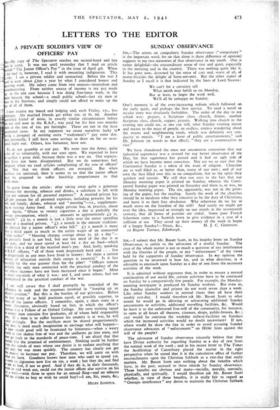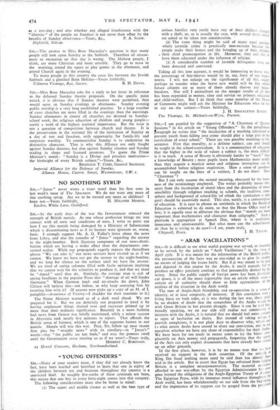Sm,—I submit that Mr. Basset Scott, in his lengthy letter
on Sunday Observance, is unfair to the advocates of a restful Sunday. The crux of the whole matter is not so much a question of any interference with the liberties of the people, or any " enforcement " of the views held by the supporters of Sunday observance. In my opinion the question to be answered is how far, and in what direction, is it advisable to encroach upon Sunday as a day of rest from the necessary activities of the week.
It is admitted without argument that, in order to ensure a normal continuation of our social life, certain activities have to be continued on Sunday by a comparatively few people. For example, the Monday- morning newspaper is produced by Sunday workers. But even so, the Sunday journalist and printer do not work seven days a week. Like other Sunday workers in normal times they all have their weekly rest-day. I would therefore ask Mr. Basset Scott to what extent he would go in allowing or advocating additional Sunday amusements or activities, additional travelling facilities, &c. Would he leave it to the unfettered free-will of the community, for instance, to open at all hours all theatres, cinemas, shops, public-houses, &c. ; and would he continue the weekday railway-facilities on Sundays which the increased activities would no doubt necessitate? If not, where would he draw the line in order to avoid accusing Sunday observance advocates of " enforcement " on Hitler lines against the will of the people?
The advocates of Sunday observance sincerely believe that they have Divine authority for regarding Sunday as a day of rest from the normal work of the week ; and in his recent letter to The Times the Archbishop of Canterbury placed the matter in the right perspective when he stated that it is the cumulative effect of further encroachments upon the Christian Sabbath as a rest-day that really matters. Mr. Basset Scott says nothing about the benefits which have, in the past, accrued to these islands by Sunday observance. Those benefits are obvious and many—socially, morally, mentally, physically, and spiritually. I would therefore ask Mr. Basset Scott whether, in view of these benefits, it is really fair to regard as " Gestapo interference " any desire to maintain the Christian Sabbath
as a rest-day ; and also whether any alleged interference with the " liberties " of the people on Sundays is not more than offset by the
benefits of Sunday observance.—Yours, &c., P. A. SHAW. Highfield, Sidcup.































 Previous page
Previous page